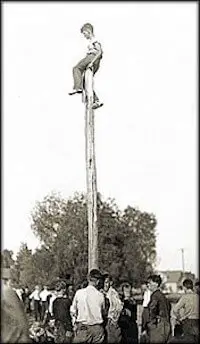‘Up the pole’ has various meanings, including:
– The literal, climbing on a pole
– Crazy
– In difficulty
– Pregnant
‘Up the pole’ has various meanings, including:
– The literal, climbing on a pole
– Crazy
– In difficulty
– Pregnant
‘Up the pole’ is an odd phrase, or rather, it is an odd collection of phrases, in that it has numerous meanings. These meanings have little to do with each other and, for the most part, little to do with poles. What is difficult to explain is how and why several different meanings for the same expression were all coined in the UK just a few years apart. Of course, poles are commonplace objects and instances of the expression ‘up the pole’ have abounded in print for centuries – bears/beans/monkeys climbing ‘up the pole’, people lifting/digging/staring ‘up the pole’ etc. Perhaps now would be a good time to list the various figurative meanings, in date order of their coinage:
In favour or good repute; strait-laced – A. Barrère & C. G. Leland Dictionary of Slang, 1890:
“Pole, up the, thought well of by your superiors. Also applied to strict, strait-laced people, who are or like to be considered goody-goody”.
These two slang meanings, which are of military origin, appear to be the first coinage of ‘up the pole’. Given that source, the pole may have been a flagpole, but the citation above doesn’t make that clear.
In confusion or error – The Daily News, April 1896:
“She remonstrated with the latter, and told him he was ‘up a pole’ – that is, in the wrong”.
In trouble or difficulty – A. R. Marshall’s Pomes from Pink ‘Un, 1897:
“He heard himself alluded to as being ‘up the pole'”.
[Note: This book was a popular collection of poems. The Pink ‘Un was a newspaper printed on pink paper – either the Sporting Times or the Financial Times.]
Drunk – Daily Telegraph, December 1897:
Plaintiff: but your little girl was frequently saying that you were ‘up the poll’.
Judge: Up the what? The High Bailiff explained that the term was a slang one for being intoxicated.This meaning is antiquated and now rarely used.
Crazy; at one’s wits’ end – Westmoreland Gazette, March 1904:
“Plaintiff’s definition of the phrase ‘up the pole’ differed from that of her cousin who said it meant being drunk. Mrs. Frasier said that it meant being crazy”.
This version appears to have travelled from the UK to Australia and New Zealand, where it is still commonly used. In a classic example of folk etymology, ‘up the pole’ has been suggested to be named after De La Pole Psychiatric Hospital, Hull, UK – after the fashion of ‘doolally‘ being taken from Deolali sanatorium, India. Inmates who were sent there were supposed to have been sent ‘up De La Pole’. Inventive guess, but De La Pole Hospital was so named in 1936.
Pregnant – James Joyce, Ulysses, 1922:
“That red Carlisle girl? Is she up the pole? Better ask Seymour that”.
As befits such a celebrated book as Ulysses, this is the version of the phrase that most people know. It is also the only one that appears to refer directly to any sort of pole – the alternate version of this ‘pregnant’ meaning are ‘up the stick’ and ‘up the spout’ leaving little doubt about what ‘pole’ was being referred to. All the early usages of this meaning in print come from the pens of Dublin based authors, so an Irish origin seems highly likely.
The only thing tying the versions of the phrase together is that they (apart from the first) relate to some degree of difficulty. It may be that the people coining meanings for this expression were alluding to the apparent difficulty of being stuck at the top of a real pole – but we aren’t ever likely to confirm that. There was a fad for ‘pole-sitting’ in the early 20th century, in which participants were certainly ‘up the pole’ and could be said to be in some difficulty, but that comes too late for it to have been the source of this phrase.
Trend of up the pole in printed material over time

A B C D E F G H I J K L M N O P Q R S T UV W XYZ
American Animals Australian Bible Body Colour Conflict Death Devil Dogs Emotions Euphemism Family Fashion Food French Horses ‘Jack’ Luck Money Military Music Names Nature Nautical Numbers Politics Religion Shakespeare Stupidity Entertainment Weather Women Work
Have you spotted something that needs updated on this page? We review all feedback we receive to ensure that we provide the most accurate and up to date information on phrases.